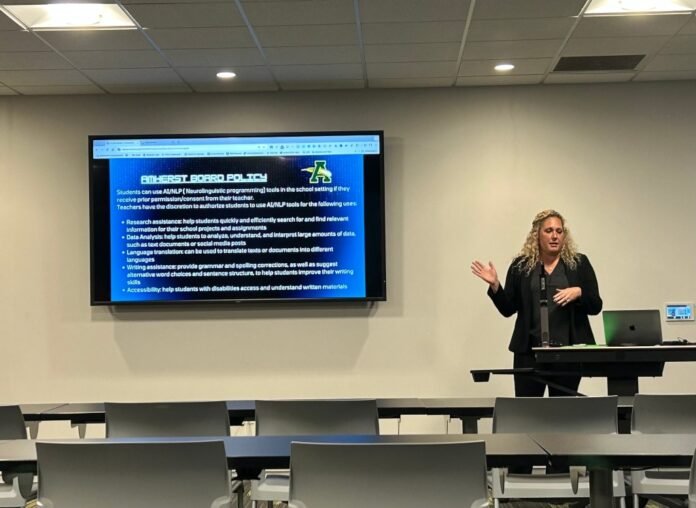Amherst Exempted Village Schools has made the right decision to educate parents and district students about the pros and cons of artificial intelligence.
Amherst technology innovation specialist Amanda Sears hosted a session on “AI Uncovered: A Community Introduction” on Oct. 16 at Marion L. Steele High School.
The information session raised awareness about what AI is, how it is used in everyday life and possible risks.
Artificial intelligence, commonly known as AI, is a field of science concerned with building computers and machines that can act, learn, and reason in ways that would normally require human intelligence, or involve data whose scale is greater than what people can analyze.
Students are using AI in schools, and more parents and community members should be aware of the technology as well.
Sears believes that AI is such an important topic that more people need to understand the knowledge behind AI and what it can do.
The Amherst Exempted Village Schools Board of Education has established a proper AI use policy for students, stating that they can use the technology for research support, data analysis, language translation, writing assistance, and accessibility, with teacher permission of course.
One of the main reasons for the district policy is to encourage students and teachers to use AI technology in a useful and appropriate way.
Amherst Schools’ goal is to teach students how to use AI effectively.
That’s because AI isn’t going away.
So the better students understand it, the better they can use it.
And parents are no exception.
Sears pointed out that true AI is still in its early stages and the technology more commonly used by humans is called machine learning.
While AI technology can perform tasks on its own, machine learning involves a computer collecting information and patterns without being explicitly programmed.
Sears discussed ethical considerations with AI in healthcare, government and crime, as well as biases and trending news about the technology.
While there is some good with AI, unfortunately the criminals, the crooks and the unscrupulous have found ways to deceive and rip off unsuspected people.
So it’s crucial that people recognize how AI can impact their lives, whether it’s a scam phone call with snippets of a loved one’s voice or spreading an AI-generated photo to deceive.
Amherst Schools informs people about the good and bad sides of AI.
Artificial intelligence must be understandable and bring knowledge to everyone, instead of to a select group.
Amherst Schools deserves credit because officials there saw the need to educate the community about AI.
Sears believes it is important to bring the technology to the attention of the community.
Using language that the audience understands helps convey information about the technology and can help young students as they grow with the technology.
There are many benefits of AI.
Artificial intelligence can assist with automated workflows and processes, or work independently and autonomously from a human team.
For example, AI can even help automate aspects of cybersecurity by continuously monitoring and analyzing network traffic.
Similarly, a smart factory could have dozens of different types of AI in use, including robots that use computer vision to navigate a factory floor or inspect products for defects, create a digital twin, and perhaps use real-time analytics to improve efficiency and output to measure. .
Authorities believe that AI can reduce human errors.
Also, artificial intelligence can eliminate manual errors in data processing, analysis, assembly in production and other activities through automation and algorithms that follow the same processes every time.
Another benefit of AI is that it can be used to perform repetitive tasks, freeing employees to work on other issues or problems.
Artificial intelligence has been used to verify documents, transcribe phone calls and answer some customer questions, such as specifying opening and closing times for businesses and nonprofits, or if a golf course is closed due to bad weather.
In some cases, AI can process more information faster than a human, finding patterns and discovering relationships in data that a human might miss.
Furthermore, AI is not limited by the time of day.
The technology may need maintenance, but it doesn’t require a lunch or bathroom break.
Scientists believe that AI can analyze infinite amounts of data quickly, which could lead to accelerated breakthroughs in research and development.
Amherst Schools is doing a good job helping people learn more about artificial intelligence.





